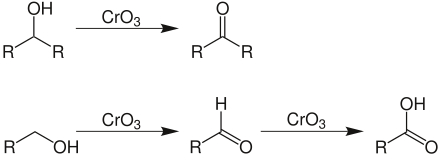- Jones-Oxidation
-
Die Jones-Oxidation ist eine chemische Reaktion der Organischen Chemie, die der Oxidation von Alkoholen und Aldehyden dient. Primäre Alkohole werden hierbei zunächst zu Aldehyden, dann zu Carbonsäuren oxidiert, sekundäre Alkohole zu Ketonen. Als Oxidationsmittel dient Chrom(VI)-oxid, das zu Chrom-(IV) reduziert wird, und anschließend zu Chrom-(III) und Chrom-(VI) disproportioniert. Die Reaktion wird in konzentrierter Schwefelsäure meist in Anwesenheit von Aceton (Jones-Reagenz) durchgeführt. Im Gegensatz zur Swern-Oxidation und zur Dess-Martin-Oxidation muss der eingesetzte Alkohol in stark saurem Medium beständig sein. Die Jones-Oxidation wird nur selten verwendet, da Chrom(VI)-oxid sehr giftig, cancerogen und mutagen ist, und die entstandenen Chromabfälle außerdem aufwendig entsorgt werden müssen.
Mechanismus
Der Mechanismus der Jones-Oxidation ist nicht vollständig aufgeklärt. Der hier angegebene Mechanismus ist nur eine von mehreren denkbaren Möglichkeiten. Hierbei greift der Alkohol zunächst nukleophil am Chromkern an. Der Alkohol wird deprotoniert und es kommt zur α-H-Eliminierung unter Abspaltung der Chromspezies und Bildung eines Carbonyls.
Verwendung
Aufgrund ihrer Gefährlichkeit sollte die Jones-Oxidation, wenn möglich, durch äquivalente Reaktionen wie etwa die Swern-Oxidation ersetzt werden. Sie kann lediglich zur Synthese von Ketonen und Säuren eingesetzt werden. Das Anhalten der Reaktion auf der Stufe des Aldehyden ist nicht möglich. Im Substrat vorhandene Doppelbindungen werden meist nicht angegriffen.
Quellen
- K. Bowden, I. M. Heilbron, E. R. H. Jones, B. C. L. Weedon: Researches on acetylenic compounds. In: Journal of the Chemical Society. 39, 1946.
- Reinhard Brückner: Reaktionsmechanismen. 3. Auflage. Elsevier, München 2004, ISBN 3-8274-1579-9, S. 742 f.
Wikimedia Foundation.


